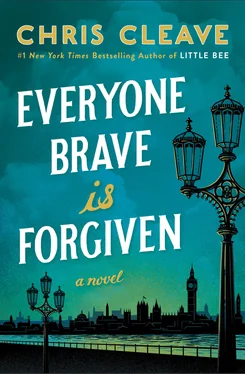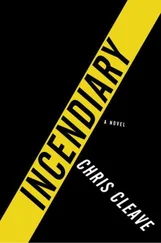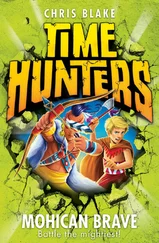“Don’t be wet,” said Hilda. “These poor people have been through hell.”
“But I feel such a ghoul for gawping.”
“We’re observing. And I’m damned if we’ll be the only ones who haven’t. It’s all anyone will be talking about.”
Mary gave in. They linked arms, going around gas flares that rose from cracked mains. They gave a wide berth to sewage bubbling up.
“You see?” said Hilda. “This is why I prefer the West End.”
“This isn’t funny at all.”
Hilda looked as if she might cry. “Did you kiss him?”
“I’m sorry?”
“Did you and Alistair kiss?”
Mary hesitated. “Shall we talk about it at home?”
“There’s no privacy there. If Palmer isn’t hovering then your mother is materializing over one’s shoulder. It isn’t a home, it’s a haunting.”
Mary looked away down the shattered alley. “At your flat, then.”
“ ‘But it’s never the right moment, with you. You think you can do what you like, and we never mention it. But what about Tom? What about me?”
“I didn’t kiss Alistair, if you must know.”
“I don’t believe you for a moment.”
Mary shrugged. “Fine.”
Hilda’s hands shook. “You can tell me. I won’t say anything to Tom.”
“Gosh. Well. That’s big of you.”
“Please don’t be cross,” said Hilda, chewing her lip. ‘I saw how you looked at Alistair.’
Mary softened. “ ‘Well one does look, doesn’t one? The eye may be an obligate scout but the heart is not an incurable follower. Anyway, I saw how you looked at Alistair too.”
“But I was there to look, and you weren’t. We feign dispassion, don’t we? It is called manners.”
“Have it your way. But I didn’t kiss him.”
“Then what were you doing all that time?”
“We were talking. You should try it. It’s hardly my fault if you pack your wits into a hatbox whenever a gentleman calls.”
“But you’ve no right always to poach the man I like, just since you can.”
“I didn’t poach. I took him his bag. I told you to do it but you wouldn’t.”
“I was furious with him, don’t you see? For going off without saying goodbye. I could hardly show it by running after him with his luggage.”
“ ‘Well, you must tell me how fury is turning out for you.”
Hilda scowled at the ground. “You’d be the same, if it happened to you.”
“You should have followed him out of the basement. You didn’t have to send me.”
“I was scared!”
“And you suppose I wasn’t?”
Hilda only raised her hands and let them fall to her sides.
Mary closed her eyes for a moment. “I promise I didn’t do anything with Alistair. I’m in love with Tom and I try extremely hard to show it.”
Hilda gave her a bitter look. “And did trying work, last night?”
“Yes. All that happened was that Alistair went away on a train, with his bag, to who-knows-where he’s to be deployed. So if you’ve anything to say to him I suggest you jolly well write. I shan’t think of him again. I have a man I love, and a class to teach, and for me the matter is closed.”
“And yet you are always, incorrigibly, you.”
“All I can tell you is how you seem to me now. This rubble was people’s homes only yesterday. And here’s you, standing on it and bleating. Sometimes, Hilda, though I try not to, I think you impossibly spoiled.”
The color bled from Hilda’s face.
“Oh no,” said Mary, reaching out. “I’m sorry. I shouldn’t have said that.”
Hilda pushed her arm away. “I’m glad you did. Because although I’ve tried for years not to, I think you impossibly selfish. I know you kissed Alistair. I’m exhausted from always forgiving you, and I simply won’t do so anymore.”
“Please—” said Mary.
“No. Goodbye. I’ll go home on my own.”
Glass cracked under her boots as she went. Mary slumped against a steaming wall and looked up at the sky. The blue was stained by updrafts of smoke as the air drifted toward the fires in the docks. How sad one could feel. She wondered how it had happened that Tom was so distant, and Hilda so bitter, and the world so thoroughly shattered.
She supposed she ought to go home. At least as one went west the streets would become clean and undamaged. One could always imagine that one’s life, though smoldering in parts, might be undamaged in the west.
She took the long way home along the Embankment. The Thames was black with oil. Sickly foam gushed up wherever the deep current of the river was forced to the surface by obstructions — crashed bombers, buses blown off bridges — who knew what was down there now? The old and changeless river was suddenly uncharted. She stared down into the black water, scorched in patches by little pools of burning oil that whirled and eddied in the current. Flaming barges, their mooring ropes burned through, were drifting upstream on the flood tide. She wondered how far upriver the barges would get. If they kept on burning then it would be a furious light they cast on Pimlico, where Palmer, even now, must be readying tea to serve at four.
SNOW WAS FALLING OUTSIDE the window of Tom’s office at the Education Authority. A secretary brought him a manila envelope containing a letter from the Royal Air Force. He gave a silent prayer of thanks. He had volunteered after that terrible night in the basement of the Lyceum, and held his breath ever since. Now he stubbed out his cigarette in the blue glass ashtray on his desk, took a deep breath and tore the letter open.
These were the facts: he had achieved an excellent pass on one hundred verbal and spatial exercises to be completed in ninety minutes. He had seen the numbers nine and four in a field of dots that would have seemed numberless to men who could not perceive color. He had surrendered into glass vials 1 (one) fluid ounce of urine and 1 (one) of venous blood, and both had been assayed and found to be as suitable as such fluids could be.
Under the supervision of a mustachioed man from Bristol he had stripped to his smalls and completed fifteen push-ups and eight pull-ups, then climbed a rope eighteen feet in height and two inches in diameter. Using the check boxes provided he had affirmed that he was neither an atheist nor a conscientious objector, and that his allergies were nil. A nurse had cupped his scrotum while he coughed, though the letter did not mention this.
It went on to confirm that he had performed well at interview. The recruiting officer had liked Tom’s use of the RAF’s published battle losses. Twenty men per day were being killed: Tom had framed it as one good man each hour. When viewed in that way, he had told the interviewer, one understood a life’s value concretely. One saw the hours as a chain joining peacetime to peacetime, with oneself as a willing link. The recruiting officer had found his answer very satisfactory.
Tom couldn’t wait to show Mary the letter. There had been such a distance between them since the raids began. Nothing was said but he missed the way they used to walk — as they had after their first night together — through a world made anew. He missed the way they had made rain hilarious, and passersby mysterious, and bridges cross more than the river.
Of course there was the bombing, which kept them apart every night, she in the Anderson at her parents’ home and he in the public shelter on Prince of Wales Road. But even alone together at the weekend in the garret, there was a certain hesitation. Their lovemaking felt like politeness.
But now here was the letter, to remake him in Mary’s eyes and his own. Life had finally arrived and been released from its manila envelope.
In the final paragraph the recruiting officer regretted to inform him that his application had been vetoed by the War Office, who considered his current role essential. He read the thing through again, and there was no ambiguity. It was a feature of the authorities that they could exempt one’s profession from service without sparing one’s feelings. Tom sat in his empty office, laid his head on the desk and closed his eyes.
Читать дальше












